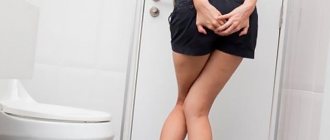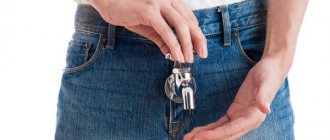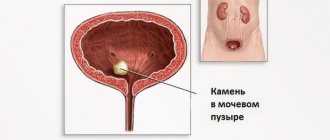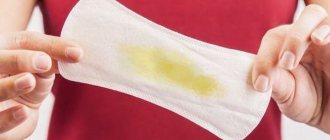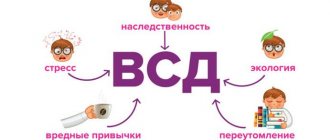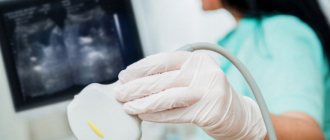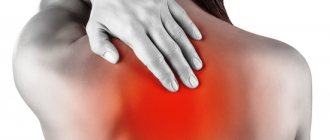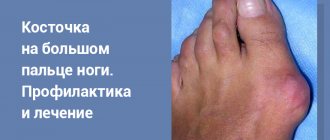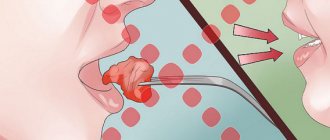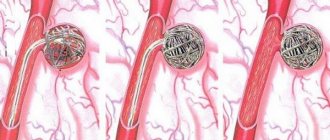Why do cramps occur?
Pain and pain in the bladder organ can be conditionally classified according to the causes of occurrence:
- development of urolithiasis;
- inflammatory processes, cystitis, especially in the acute stage;
- benign type hyperplasia in the prostate gland;
- developing endometriosis;
- cystalgia;
- neoplasms of malignant etiology;
- papillomas.
Clinical practice has established that almost all of these pathologies are accompanied by inflammatory processes, for example, prostate adenoma or urolithiasis. In all cases, the mechanism of disease progression occurs against the background of stagnant processes, thanks to which pathogenic microorganisms and bacteria receive suitable conditions for reproduction and growth.
Inflammation accompanying the pathology greatly complicates the process of treating the underlying disease, since mucosal growths, swelling and severe pain interfere with diagnosis and surgical intervention to remove formations.
The syndrome can be a consequence of pathologies of the muscular organ itself, as well as diseases of other organs of the urinary system - kidneys, ureters, urethra. Among the diseases that can masquerade as bladder pathologies in women are also disorders of the musculoskeletal system and in the genital area.
The anus is located close to the urethra, and the slightest failure to comply with hygiene rules can lead to urinary tract infection. Pregnancy and childbirth, hormonal changes contribute to the weakening of local immune defenses and the development of diseases of the kidneys and ureters. The most likely cause of unpleasant symptoms is cystitis. It can be caused by Escherichia coli, staphylococci, Proteus, streptococci, enterococci.
Inflammation sometimes occurs after medical procedures or burns with medications. During pregnancy or immunodeficiency, exacerbations of cystitis are observed very often. Another variant of the inflammatory process in the bladder is interstitial cystitis. This is a severe form of the disease, in which ulcers, erosions, and foci of necrosis appear on the walls of the organ. The pain in this case varies from moderate to unbearable and intensifies during menstruation.
Rarer causes of pain may include:
- A diverticulum is a sac-shaped cavity formed by the wall of the bladder. It promotes the constant development of the inflammatory process in the organ.
- Urolithiasis is a urolithiasis. Sharp stones often cause injury to the walls of the organ with severe pain in it. Cancer tumor. This disease occurs infrequently, but in the final stages it causes constant pain combined with bleeding and the appearance of urine the color of meat slop.
- Benign tumors. Hemangiomas, adenomas, papillomas, polyps, endometrioid formations and cysts can cause pain only when they are large in size, when they begin to put pressure on the nerve endings. Tuberculosis. This disease usually spreads throughout the entire organ. Pain appears only after several years if treatment has not been carried out.
Almost always, pain in the bladder area is associated with some disease. The following pathologies are most typical for women:
- Urolithiasis disease. Stones, moving inside the organ, provoke sharp pain, the intensity of which increases with physical activity. From the bladder, stones can enter the urethra: a change in location is accompanied by a significant deterioration in well-being - the woman cannot find a place for herself, constantly experiencing excruciating pain.
- Cystitis. This is an inflammation of the bladder mucosa caused by infection. The affected organ naturally reacts to the pathology that has developed in it, sending pain signals to the brain. Unpleasant sensations are also experienced during urination: severe pain turns the natural process into a real test.
- Inflammation of the female genital organs. These include adnexitis (damage to the appendages), parametritis (inflammatory process in the periuterine tissue), perimetritis (disease of the outer lining of the uterus). As a rule, the pain in these pathologies is quite acute. Often the infection moves from the genitals and enters the bladder, causing the already mentioned cystitis.
- Bladder rupture. The organ itself is very elastic. But the more urine there is, the more the walls have to stretch and the thinner they become. If the organ is hit in this state, it may rupture. This often happens during an accident, a fall, or strong shaking in transport. A woman with a burst bladder will experience severe pain and a constant desire to urinate (though she will not be able to pee due to the injury). Another symptom is blood from the urethra.
- Bladder tumor. The neoplasm can be either benign or malignant. In any case, it provokes constant dull pain in the lower abdomen. If the tumor begins to disintegrate, the discomfort will become unbearable. Most often, neoplasms develop in women over 40-45 years of age.
- Paracystitis. This is the name for inflammation of the peri-vesical subcutaneous fat. The pain is constant, but at the same time it is not sharp and dull. Swelling may occur, localized above the pubis.
Any of these diseases requires a visit to the doctor. There is no need to do anything on your own: both diagnosis and therapy should be carried out by a specialist.
In order to find out why the bladder hurts, you first need to understand what exactly the bladder itself is.
The bladder is a hollow organ that serves to store urine, which in turn flows through the ureters and is discharged through the urethra.
Pain affecting the bladder can have various causes.
Most often they occur in the lower abdomen, but this may also indicate diseases associated with the kidneys, ureters or other organs.
Bladder pain may occur due to disruption of the normal functioning of certain organs, such as:
- Kidneys;
- Bladder;
- Ureters;
- Urethra;
- In men, the prostate gland.
Now let's look at the diseases that cause pain in the bladder:
- Urolithiasis disease. With this disease, stones enter the urethra, moreover, the process is accompanied by terrible pain, as well as urinary retention or the inability to defecate due to constant urge.
- Cystitis. This type of disease is associated with inflammation of the bladder mucosa. In this case, the bladder hurts after urination. And with chronic cystitis, constant pain and frequent urge to urinate are observed.
- Inflammation of the appendages or adnexitis can also cause pain in the bladder.
- Tumor. This disease is accompanied by dull pain in the lower abdomen, and at the last stage the pain becomes simply unbearable, which causes enormous agony and discomfort to the patient.
- Perimetritis. Inflammation of the peritoneal tissue around the uterus, as well as adjacent tissues. As a rule, it is infectious in nature and causes acute pain in the patient.
- Inflammation of the tissue that surrounds the uterus.
- Bladder rupture. It can be caused due to certain mechanical influences, for example, when involved in an accident. The main symptom is the absence of urine output, although some blood appears from the urethra.
- Prostate adenoma. This disease makes it difficult for urine to pass out, but at the same time the bladder stretches and increases in volume, being released from the abdominal cavity.
- Cystalgia. This disease is very similar to cystitis, but the difference is that with cystalgia there is no inflammation of the mucous membrane of the bladder. This disease is unique to women and mainly affects only those who lead a sedentary lifestyle.
Symptoms of the disease and causes of its occurrence
In women, the inflammatory process can manifest itself in different ways. Symptoms of the disease may appear immediately or increase gradually.
A burning sensation in the bladder can occur due to diseases of other organs: kidneys, ureter, urethra, genital area. Pain can be caused by sharp stones and burns. But the most common cause is cystitis (inflammation of the bladder).
In women, pain in the lower abdomen is often caused by a disease of the genital organs. Adnexitis, perimetritis and other diseases contribute to the spread of infection in the pelvic area.
amney Pain may be constant or appear during urination. During active physical activity, pain in the bladder appears due to stones that injure the mucous membrane when moving.
Main symptoms of the disease:
- sharp, sharp or nagging pain;
- discomfort during the act of bowel movement;
- difficulty urinating;
- blood in urine;
- elevated temperature;
- false urges.
Fever usually appears when the infection has spread beyond the bladder and risen higher.
The main causes of burning in the bladder:
- inflammatory process;
- tumors;
- gynecological diseases;
- injuries;
- hypothermia;
- stones.
If the bladder hurts in women, it is most often associated with an infection, but gynecological pathologies, blood stagnation, hypothermia, and menstruation can also cause discomfort.
The most severe pathology is tumors, which are initially accompanied by mild pain. Gradually the process becomes uncontrollable.
Cystalgia, a disease that occurs only in women who lead a sedentary lifestyle, can cause pain when urinating.
Due to blood stagnation, nervous and physical stress, consumption of spicy, salty foods, and alcoholic beverages, the burning sensation in the bladder may intensify and requires immediate treatment.
Bladder pain in women and men
According to statistics, bladder diseases are much more common in women than in men, which is due to the structure of the body of the fairer sex. The bladder hurts especially often in pregnant women, as the growing fetus begins to put pressure on the organ.
In men, bladder pain is most often due to diseases of the prostate gland (prostate adenoma, prostatitis), as well as when problems arise with the excretory system. When kidney stones or pyelonephritis are detected in a man, in addition to severe pain, chills, fever and increased body temperature occur.
In women, the main causes of bladder pain are ectopic pregnancy and diseases of the internal genital organs, such as:
- Endocervicitis;
- Salpingo-oophoritis;
- Ovarian apoplexy;
- Endometritis.
How can you help your body cope with the disease on its own?
It often happens that the pain at the end of urination becomes unbearable; every trip to the toilet is a real test that cannot be overcome without tears. There are measures that can help you independently reduce the intensity of pain until your doctor prescribes drug therapy.
By increasing the amount of drinking water, you can reduce the concentration of urine and the level of trace elements, which are irritants for the bladder and the entire urinary system.
To relieve inflammation and swelling in the urinary organs, you can use foot baths. When the legs heat up, the blood begins to descend through the veins, which reduces the intensity of the inflammatory process.
Carrying out procedures with hot water is contraindicated for people with venous insufficiency or thrombosis in the legs.
It is worth reviewing your diet not only during first aid, but also for the entire period of treatment. It is necessary to completely eliminate fried, spicy, smoked, salty, sour, fatty foods, and drink more still water.
A woman's bladder hurts: treatment
The word "cystalgia" is translated from Greek as "pain in the bladder." The peculiarity of this condition is the persistence of typical symptoms of cystitis with objectively good test results. It turns out that there is no inflammation, but there is still pain.
Cystalgia is not talked about so often, although it is diagnosed in 10-15% of women who consult a urologist. Characteristic signs of this condition:
- pain in the bladder with a minimal amount of accumulated urine;
- Urinary urgency that is very difficult or impossible to tolerate;
- constant feeling of fullness of the bladder;
- pain radiating to the perineum and lumbosacral region.
As a rule, cystalgia occurs latently, worsening in autumn and winter. The pain is not very strong, but constant, often occurring without any apparent reason. Among the main reasons for the development of pathology:
- Strong emotional experiences, frequent quarrels and stress.
- Sedentary lifestyle, lack of minimum required physical activity.
- Sexual dissatisfaction, fear of intimacy, the practice of coitus interruptus as a method of contraception.
- Abuse of alcoholic beverages, predominance of spicy foods in the diet.
- Presence of gynecological diseases, ovarian dysfunction.
- Pregnancy or abortion.
- An allergic reaction to certain products (for example, some patients experienced swelling of the bladder neck when drinking milk).
- Changes in hormonal levels (especially important for women during menopause).
If cystalgia has developed due to nervous experiences, then it is called psychosomatic cystitis. In fact, this condition can be classified as a type of neurosis.
Carrying a child is a real test for the body. The expectant mother will face many surprises in terms of her well-being, and one of them is pain in the bladder.
This phenomenon can be explained simply: as the fetus develops, the uterus enlarges and gradually puts more and more pressure on the internal organs. In the first stages, such pressure only leads to an increased desire to urinate, but in the second half of pregnancy, the ureters are pinched and, in general, the blood supply to the bladder deteriorates.
Despite the relative normality of bladder discomfort during pregnancy, a woman should not ignore the symptom. Processes occurring in the body can provoke stagnation of urine, which will result in the active proliferation of pathogenic bacteria. As a result, cystitis will develop.
Getting rid of pain first involves eliminating its cause. To do this, a woman should contact a therapist, urologist and gynecologist. Only after identifying the main factor causing discomfort can treatment begin.
As a rule, the patient needs to do:
- Ultrasound of the pelvic organs;
- urine tests (according to Nechiporenko, general, biochemical);
- general blood analysis;
- cystoscopy;
- a smear on the flora and other studies that the doctor considers necessary.
Once the diagnosis is made, appropriate medications are prescribed. For example, for cystitis, these are antibiotics, antiviral or antifungal drugs, as well as herbal products. If the pain is caused by an injury or tumor, surgery may be required.
With cystalgia, the main emphasis is on restoring normal blood circulation in the pelvic organs. This is facilitated by physical exercise, long walks and regular sex with a regular partner.
If the pain is difficult to bear, you can take a pain reliever. Antispasmodics have proven themselves well - No-shpa, Droverin, Papaverine. It is also acceptable to use Analgin or Aspirin (the latter should not be taken if there is blood in the urine).
Heat helps to quickly relieve pain. Fill an opaque plastic bottle with warmed water, wrap it in a towel and apply it to the groin area or lower abdomen. After a few minutes, the discomfort will begin to subside.
Any pain is an alarm signal that the body sends to a woman. Therefore, this symptom cannot be ignored: it is better to be safe than to miss the initial stage of the disease.
The bladder plays a very important role not only in the urinary system, but also for the entire body as a whole. Collecting fluid filtered by the kidneys, this organ can be susceptible to many pathological conditions, especially in the female sex.
Pain syndrome can accompany inflammatory pathologies, be a sign of disorders in the kidneys, genitals, urolithiasis, and various types of injuries. Unpleasant sensations are a frequent companion for the fairer sex during pregnancy or the postpartum period.
Pain in the bladder area is almost always accompanied by problems with urination. This symptom signals a disease or pathological disorder.
Having correctly analyzed all aspects of the discomfort, the doctor will be able to determine the root cause of pain in the bladder and decide on further actions. For timely prevention of simulating pathological abnormalities of the urinary storage organ, it is necessary to accurately identify the exact location of the outgoing pain impulses.
Thus, having understood the characteristics of pain in the bladder in women, the doctor makes a primary conclusion about what disease this symptom is a sign of.
To characterize the pain syndrome, the following differentiation is used:
- intensity;
- duration;
- when it increases or decreases;
- under what conditions it appears or disappears;
- localization;
- what accompanies;
- current or past pathologies;
- injuries;
- medical intervention.
Fertility is a strong argument for severe pain in the bladder. However, to a greater extent, the occurrence of this symptom is primarily associated with the anatomical features of the female urinary system. Its structure allows pathogenic agents to easily penetrate and be retained.
The most common provoking factor in the normal state or during pregnancy is staphylococcus or bacteria. Characteristic changes that affect the urinary storage organ contribute to the development of infectious diseases and the appearance of unpleasant symptoms.
Pain during pregnancy or during normal periods in most cases signals the occurrence of inflammatory pathologies. Failure to seek medical help in a timely manner leads to further progression of the disease, with its transition to a chronic form.
Treatment of cystitis at home
At home, it is difficult to bring a sick person to full recovery, so the disease can enter the chronic phase.
Many people stop treating cystitis after the first symptoms disappear. Ill-conceived treatment can mask, but not cure, the disease, so a prerequisite for effective treatment is to see a doctor.
Traditional methods help treat the disease, but they are good as an additional remedy. A severe infection cannot be cured with herbs.
At the initial stage of the disease, warm sitz baths using herbal decoctions, a warm heating pad or bath are effective. Such procedures are contraindicated when urinating with blood.
You can put a warm potato compress on the lower abdomen. It is imperative to follow a diet that helps reduce the saturation of urine with salts and relieve painful symptoms.
Spicy, salty and sour foods increase the inflammatory process, so you need to consume plant foods and fermented milk products for a long time.
At home, decoctions of chamomile, St. John's wort, and bearberry are used for treatment. An excellent preventive and therapeutic agent is cranberry, which has antiseptic and anti-inflammatory properties.
Lingonberry leaf, horsetail, and bear's ears are good for removing infection and reducing inflammation in the bladder. A decoction of hops, onions with honey, and pumpkin seeds strengthen the diseased organ and normalize the general condition of patients.
Juices, jelly, compotes, fruit drinks and weak tea help remove bacteria from the body. You should not drink coffee, sparkling water or alcohol during treatment.
Beets, carrots, pumpkin, cucumbers help recovery, unlike citrus fruits, which are contraindicated for cystitis. Propolis tincture and rowan bark decoction, taken for a month, also have a good healing effect.
Black radish juice and honey, mixed in the same ratio, are taken 3 times a day after meals to reduce the inflammatory process. Herbs are effective if taken regularly and over a long period of time.
It is necessary to strengthen the immune system to restore normal microflora in the vagina. It is important to observe the rules of personal hygiene, not to overcool, and to control your body, because cystitis can lead to cancer.
Pain in the bladder can also be caused by other diseases, so you need to undergo a thorough examination and receive a doctor’s prescription in accordance with the identified disease.
Taking specialized medications under the supervision of a urologist and gynecologist, traditional methods and procedures will help you get rid of the disease.
urinaria.ru
Pain, independent of the act of urination, appears when driving on a bad road or during physical work.
Pain that occurs in the bladder area when moving is characteristic of bladder stones and is explained by their movement in the bladder cavity.
Pain arising in the bladder is concentrated in the lower abdomen. However, pain in this area may indicate not only diseases of the bladder, but also disorders of the kidneys, ureters, genitals, etc.
Causes of bladder pain.
Pain in the bladder (and in the bladder area) can be caused by diseases of the following organs:
- the bladder itself, kidneys, ureters, urethra (urethra), female internal genital organs, prostate gland (in men), tailbone.
Pain that occurs in the bladder area when moving is characteristic of bladder stones and is explained by their movement in the bladder cavity.
The pain in the bladder area is acute, unbearable, the patient rushes about in bed and willingly agrees to any manipulation, even surgery, just to relieve the pain. Usually the patient indicates that he cannot urinate, despite the persistent urge.
Always accompanied by pain associated with urination due to cystitis (inflammation of the bladder). The pain increases as the volume of urine in the bladder increases. The act of urination itself is also accompanied by painful sensations and a burning sensation that intensifies towards the end of urination.
Prostate adenoma. This benign tumor very often causes pain in the bladder area. By narrowing the lumen of the urethra, the adenoma makes it difficult for urine to leave the bladder. Pain (sharp, unbearable) appears with acute urinary retention. At the same time, the bladder is greatly stretched and becomes visible as a protrusion of the abdominal wall above the pubis. On palpation, this area is sharply painful.
Bladder pain during pregnancy. During pregnancy, the bladder is put under pressure by the growing uterus, located directly behind the bladder.
Treatment of bladder pain.
Successful treatment of pain in the bladder is only possible if it is established what disease is causing it. Therefore, if you experience any pain in the bladder area, you should consult a urologist.
DENS therapy (dynamic electrical neurostimulation) is an effective physiotherapeutic method of eliminating pain in the bladder at home, aimed at eliminating the cause of the disease, characterized by the absence of side effects with good clinical improvement.
DENS therapy is based on the impact on biological active zones using a neuroimpulse.
With the help of a course of treatment with DENAS devices, a stabilizing effect is achieved, which is most valuable in chronic diseases.
DENAS devices are an effective remedy for eliminating acute and chronic pain. When exposed to the device, the effect occurs within a few minutes (15-30 minutes).
To eliminate pain in the bladder at home, you can use any universal device DENAS or DiaDENS
DENS technique - therapy (impact zones) for pain in the bladder area.
As a result of the use of DENS therapy, dysuric manifestations (impaired urination), pain relief are reduced, and the functional state of the kidneys and bladder improves.
In the first days of exacerbation of the disease, 2-3 procedures are performed per day until pain and dysuric disorders decrease, then 1 procedure per day. During the procedure, 2-3 zones are treated. Course 10 - 14 days.
1. Complex "kidneys-ureters-bladder"
. “THERAPY” mode, frequency 140Hz, 77Hz, 2.8Hz, minimum power level for 10 minutes. on each side or programs “PAIN”, “KIDNEYS”.
For a more comfortable and effective procedure, use the DENS applicator.
2. Lumbar-sacral zone.
“Therapy” mode, frequency 77Hz or “Back” program.
For a more comfortable and effective procedure, use the DENS applicator.
3. Correspondence zone of the bladder and kidneys according to the Su Jok system.
“THERAPY” mode, frequency 60 or 77 Hz, comfortable power level 3 - 5 min.
3. Immunomodulatory zone he-gu.
“THERAPY” mode, frequency 77Hz, comfortable power level 5 min. or MED program.
Additional options for eliminating bladder pain:
1. Therapeutic clothing: DENAS-OLM-1 blanket, 1-2 procedures per day, 20-40 minutes or DENAS-OLM-2 vest, 1-2 procedures per day, 40-60 minutes. More information here
2.Therapeutic clothing with biophotons: men's boxers; women's high waist briefs
life-denas.ru
Large baby weight
With this diagnosis, strong stabbing sensations will be localized in the upper part of the abdominal cavity. Typically, a woman begins to feel such feelings when the baby’s weight reaches 3500 g. With all this, the limit of this indicator can be increased or decreased, and the mother’s weight is also taken into account. Ladies of a more fragile build are much more likely to encounter this problem and may feel a tingling sensation in the upper part of the abdomen when the baby’s weight reaches 3000 g. The unpleasant feelings will go away only in this case, when the fetus sinks lower into the pelvis or after a specific birth.
Attention! Immediately with the stabbing sensations in the upper tummy, tingling sensations may appear in the perineum and lower tummy. Such discomfort may indicate the helplessness of the uterus and its dilation. Due to the incompetence of the organ's neck, active labor may begin.
A stabbing feeling in the lower abdomen can cause the baby to be overweight
Hypothermia
Pain after urination can occur due to general hypothermia of the body. Most often, this condition occurs as a result of prolonged swimming in cold water, long walks in the cold or strong winds in inappropriate clothing, as well as prolonged exposure to damp clothes and wet shoes.
How to recognize
When hypothermia occurs, discomfort occurs immediately after emptying the bladder. They are often accompanied by burning, discomfort, and pain.
Patients may also complain of pale skin, shortness of breath, “bluishness” of the nasolabial triangle, decreased body temperature, chills, lethargy, general fatigue, and decreased blood pressure.
Diagnostics
The diagnosis is made by a general practitioner or paramedic when calling an ambulance.
Treatment
Therapy is symptomatic. At a mild stage of hypothermia, it is carried out at home. The patient is put to bed, warmed under a warm blanket, given hot broth, and provided with peace and comfort.
In case of severe hypothermia or frostbite, emergency medical care is required and the patient must be taken to a hospital.
Types of pain when urinating
There are quite a few reasons that cause discomfort in the bladder, and depending on them, the nature and intensity of the pain can change. As a rule, there is only one localization - the lower abdomen, but it is necessary to take into account that this place can hurt not only because of diseases of this organ. It is necessary to understand how to classify the symptoms of bladder pain in women:
- Discomfort, which intensifies as the organ fills with urine, reaching its peak during the process of emptying, after which it subsides. This type of pain indicates inflammation of the mucous membrane - cystitis. In addition, the disease is signaled by frequent urination, scanty urination, and pus in the urine.
- If the same symptoms occur, but without impurities in the urine, we are talking about cystalgia.
- The feeling of pain that occurs during activity - walking, running, bending - indicates the presence of stones in the bladder. When moving, they can move, irritating the mucous membrane, which causes pain. The color of the urine changes (due to an increase in leukocytes and red blood cells in the blood).
- When the urinary organ ruptures (due to injury or overflow), the pain in the lower abdomen is very sharp and severe. There is an unbearable desire to urinate, which cannot be fulfilled due to damage to the organ.
- When hypothermia occurs, cutting pain occurs in the lower abdomen.
- A burning sensation accompanies pathologies of the urethra - inflammation, damage - and is also a sign of irritation of the external genital organs.
- Pressing pain is a symptom of kidney problems and bladder injury. Often accompanied by fever and general weakness.
- Pulling in the lower abdomen can occur due to diseases of the reproductive system, kidneys, or when a salt deposit occurs in the bladder.
- Spasms may indicate the presence of neoplasms, injuries, or renal colic.
- Discomfort and burning in women may indicate pregnancy. At the very beginning of the period, the uterus begins to increase in size, putting pressure on neighboring organs.
The same pathologies can manifest themselves in different types of pain. Under no circumstances should you make an independent diagnosis, so as not to aggravate the situation. In addition to pain, you should pay attention to:
- color and smell of urine;
- frequency of urination;
- incontinence;
- prolonged absence of urination;
- nausea;
- weakness;
- temperature increase;
- the presence of impurities in the urine - blood, pus.
What is the reason?
Only an experienced doctor can give a man an answer to the question of why the bladder hurts and how to treat it. There are several of the most common causes of this unpleasant symptom:
- Urethritis. With urethritis, the urethra becomes inflamed. The reasons for the onset of the inflammatory process can be different, but most often the disease occurs due to the entry of pathogenic bacteria into the body (fecal enterococcus, etc.).
- Cystitis. This disease is an inflammation of the bladder. A man suffering from a similar illness may experience a very frequent urge to urinate, as well as severe pain, stinging and burning after bowel movement. The causes of cystitis can be bacteria fecalis enterococcus, E. coli, etc.
- Urolithiasis disease. If there are stones or sand in the kidneys, they can begin to pass through the urethra at any time. During this process, sharp acute pain, impaired urine flow and other unpleasant symptoms occur.
- Neoplasm. Any malignant or benign tumors localized in the pelvis and grown to impressive sizes can put pressure on the bladder, causing spasms, a feeling of heaviness and discomfort.
- BPH. A benign tumor (adenoma) forms in the prostate gland. This disease most often occurs in representatives of the stronger sex after 40 years of age. In most cases, this disease causes a frequent need to urinate, while urine may come out of the urethra in small portions, and the feeling of emptying the bladder does not occur.
- Prostatitis. With this disease, inflammation of the prostate gland develops in the body of representatives of the stronger sex. The prostate increases in size, putting pressure on the nearby bladder and causing severe aching pain in the perineum. Often with prostatitis, the lower back also hurts.
- Bladder rupture. In some cases, due to injuries and bruises of the body, internal organs rupture. If the bladder ruptures, a person requires immediate hospitalization and surgery, and the doctor must be informed about the injuries received.
- Sexually transmitted infections. When microorganisms, bacteria or viruses enter the genitourinary system during sexual intercourse, acute inflammation develops, causing pain in the bladder, urethra, testicles (in women, such infections may affect the ovaries, cervix and other pelvic organs). Most often, men suffer from infectious diseases such as trichomoniasis, ureaplasmosis, chlamydia, mycoplasmosis, gonorrhea, etc.
- Neurogenic bladder. This disease occurs due to malfunctions of the part of the nervous system responsible for excretion of urine. Men who have been diagnosed with a “neurogenic bladder” experience dysfunction of the urinary system, frequent uncontrolled urination, etc.
- Diseases of the intestinal tract. With inflammation, polyps, colitis and other diseases of the intestinal tract, the pain radiates to the lower abdomen and is felt in a full or empty bladder.
- Coccyx injuries. When the tailbone is damaged, the nerve endings are pinched, and as a result, not only the lower back begins to hurt. Cramps may also be felt in the perineum and abdominal area.
Hormonal abnormalities
Hormonal imbalance is a fairly common phenomenon these days. This condition is characterized by hormonal dysfunction caused by pathologies of the neuroregulatory and endocrine systems. Appears in both women and men.
How to recognize
With hormonal disorders, the nature of the pain may be different. They occur periodically or accompany the patient almost constantly. The presence of accompanying manifestations usually depends on which hormone the body is experiencing a deficiency or an excess of. In women, hormonal disorders are almost always accompanied by disruption of the hormonal cycle, emotional lability, changes in the amount of discharge during menstrual bleeding, and sometimes the development of cystic neoplasms.
Men most often experience sexual dysfunction, emotional disturbances, and weight problems.
For women, a gynecologist-endocrinologist diagnoses hormonal disorders; for men, a urologist, andrologist and endocrinologist. The patient is prescribed tests for the amount of female and male sex hormones, as well as thyroid hormones. Additional methods include ultrasound.
To treat this condition, hormone therapy, restorative drugs, diet, and healthy lifestyle are prescribed.
Increased physical activity
The state of physical fatigue occurs against the background of prolonged physical and emotional stress.
How to recognize
Pain occurs immediately after playing sports or other physical activity and at the end of the working day. The state of physical fatigue is accompanied by general muscle weakness, aches and pain in the joints and muscles, and headache.
Diagnosis, treatment
As a rule, diagnosis is carried out at home. The patient needs rest and rest to recuperate. To relieve pain in joints and muscles, rub with anti-inflammatory and analgesic ointments (Diklak, Fastum gel, Diclofenac). It is very important to correctly distinguish physical fatigue from injury. This is especially true for women.
Lifting weights can cause disturbances in the functioning of the genitourinary system, leading to sprains and even prolapse of the uterus.
